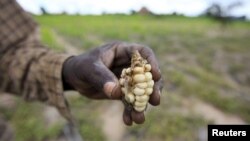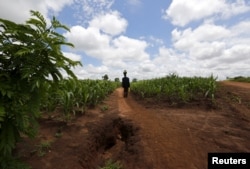Climate change is threatening some of Africa's most important crops, including corn, beans and bananas, and scientists warn that the agriculture system there needs some adjustments, and fast.
The problem is, as climate change has a greater impact on the continent's crops, some areas currently growing staple crops won't be able to support them.
The study was done by the University of Leeds and was released in Nature Climate Change.
Staple crops at risk
The numbers are startling. A full 30 percent of African farmland currently growing corn and bananas won't support those crops by by the end of the century. And an even more troubling 60 percent of land being used to grow beans won't be able to support their growth any longer.
The study's lead author, Dr. Julian Ramirez-Villegas from the University of Leeds, says the study is important because it sets out a timeline for solving the problem.
"We know what needs to be done, and for the first time, we now have deadlines for taking action," he said.
What exactly needs to be done? Villegas says it could be as simple as changing the types of crops grown in any one particular place, or improving irrigation in the region. In some extreme cases, the land may not support agriculture any longer and will just have to lie fallow.
Planning now for the future
The key, according to co-auther Andy Challinor from the School of Earth and Environment at the University of Leeds, is flexibility in response to climate change.
"Banana imports from sub-Saharan Africa to the U.K. have more than doubled since 2001, showing that his issue has implications well beyond Africa's border," he said. "The places in which crops are grown will need to alter as climate changes. The key is to plan for these changes."
Challinor says that even though the study looks ahead to the end of the century, these changes are happening now, and within the next decade Africa will lose some prime banana and maize growing crop land.






